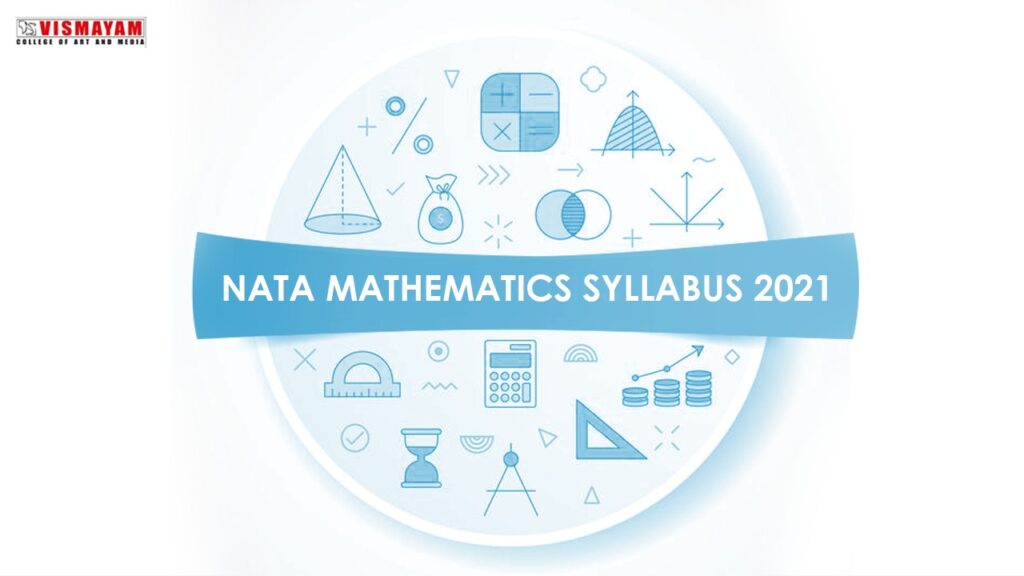Question and AnswersStudy Materials
NATA MATHEMATICS SYLLABUS 2021

NATA Mathematics Syllabus contains 10 chapters in total.To be eligible for NATA 2021 the candidate must have a minimum aggregate of 50% in Mathematics. There are no negative marks for the wrong answers and each right answer is awarded 1.5 marks. Here is a list of chapters that are part of NATA mathematics syllabus.
UNIT (NATA mathematics syllabus) |
|
Algebra |
Definitions of A. P. and G.P.; General term; Summation of first n-terms of series ∑n, ∑n²,∑n3 ; Arithmetic/Geometric series, A.M., G.M. and their relation; Infinite G.P. series and its sum. |
Logarithms |
Definition; General properties; Change of base. |
Matrices |
Concepts of m x n (m ≤ 3, n ≤ 3) real matrices, operations of addition, scalar multiplication and multiplication of matrices. Transpose of a matrix. Determinant of a square matrix. Properties of determinants (statement only). Minor, cofactor and adjoint of a matrix. Nonsingular matrix. Inverse of a matrix. Finding area of a triangle. Solutions of system of linear equations. (Not more than 3 variables). |
Trigonometry |
Trigonometric functions, addition and subtraction formulae, formulae involving multiple and submultiple angles, general solution of trigonometric equations. Properties of triangles, inverse trigonometric functions and their properties. |
Coordinate geometry |
Distance formula, section formula, area of a triangle, condition of collinearity of three points in a plane. Polar coordinates, transformation from Cartesian to polar coordinates and vice versa. Parallel transformation of axes, concept of locus, elementary locus problems. Slope of a line. Equation of lines in different forms, angle between two lines. Condition of perpendicularity and parallelism of two lines. Distance of a point from a line. Distance between two parallel lines. Lines through the point of intersection of two lines. Equation of a circle with a given center and radius. Condition that a general equation of second degree in x, y may represent a circle. Equation of a circle in terms of endpoints of a diameter. Equation of tangent, normal and chord. Parametric equation of a circle. Intersection of a line with a circle. Equation of common chord of two intersecting circles. |
3-Dimentional co-ordinate geometry |
Direction cosines and direction ratios, distance between two points and section formula, equation of a straight line, equation of a plane, distance of a point from a plane |
Theory of calculus |
Functionscomposition of two functions and inverse of a function, limit, continuity, derivative, chain rule, derivative of implicit functions and functions defined parametrically.Integration as a reverse process of differentiation, indefinite integral of standard functions. Integration by parts. Integration by substitution and partial fraction. Definite integral as a limit of a sum with equal subdivisions. Fundamental theorem of integral calculus and its applications. Properties of definite integrals. Formation of ordinary differential equations, solution of homogeneous differential equations, separation of variables method, linear first order differential equations. |
Application of calculus |
Tangents and normals, conditions of tangency. Determination of monotonicity, maxima and minima. Differential coefficient as a measure of rate. Motion in a straight line with constant acceleration. Geometric interpretation of definite integral as area, calculation of area bounded by elementary curves and Straight lines. Area of the region included between two elementary curves. |
Permutation and combination |
Permutation of n different things taken r at a time (r ≤ n). Permutation of n things not all different. Permutation with repetitions (circular permutation excluded). Combinations of n different things taken r at a time (r ≤ n). Combination of n things not all different. Basic properties. Problems involving both permutations and combinations. |
statistics and Probability |
Measure of dispersion, mean, variance and standard deviation, frequency distribution. Addition and multiplication rules of probability, conditional probability and Bayes’ Theorem, independence of events, repeated independent trails and Binomial distribution. |